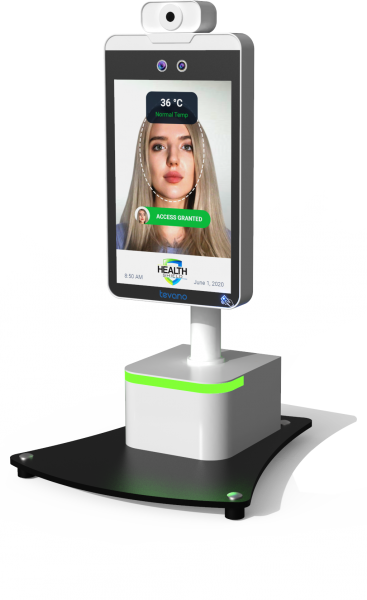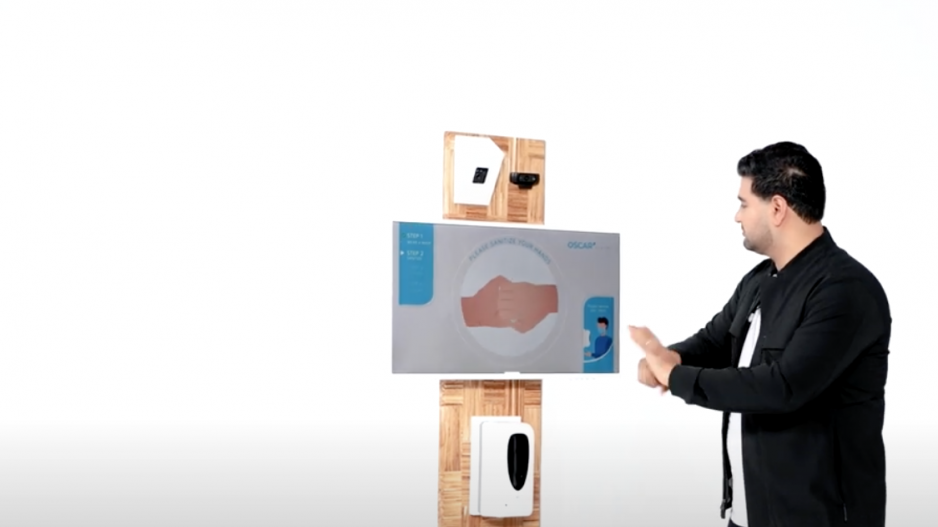Stepping into an office foyer amid the pandemic might elicit the sense of navigating a minefield of touch points:
Take a pen from the front desk, sign in on the communal log-in sheet, perhaps even get a temperature check with a device that’s been inadvertently placed against another’s forehead.
It was not an atypical for one B.C. client that might see 200-300 people walk through an entrance any given day, according to Hassan Murad.
“And that's what we saw immediately: Is how can we help these spaces and buildings that, because of COVID, are now facing challenges right at the entrance to allow people to come in?” said the co-founder and CEO of Vancouver-based Intuitive AI (Intuitive Inc.).
His answer rests in the repurposing of company technology, which is now taking the form of Oscar Hygiene screening devices being deployed at offices, hospitals and warehouses.
Someone who enters a building walks up to a display with a camera at the top and hand-sanitization unit below.
Story continues below video
The display may prompt visitors to sanitize their hands or answer a symptom questionnaire, while a thermal camera confirms their temperature before checking them in and reminding users to put on a face mask.
The settings can be adjusted depending on the location or jurisdictional requirements of where the devices are located.
“For example, down in Texas, they [health authorities] had changed … what is considered a fever at least two times. And our system updates on the go – it's sort of like a Tesla that gets an update overnight,” Murad said.
Prior to Oscar Hygiene, his tech startup had been deploying scanning devices backed by artificial intelligence in locations such as YVR and Simon Fraser University to visually identify the difference between recycling and trash.
Those particular devices, which feature cameras and large displays attached to garbage and recycling bins, can then direct users to the proper bin in which to place discarded items when they approach.
Intuitive AI’s investors had recognized the potential for the technology backing those devices to influence hygiene behaviour in hospitals as medical professionals walked into different spaces.
“That's something that they were nudging us towards and we were already working towards a solution for hand hygiene. And then COVID happened,” Murad recalled.
Work on the R&D project accelerated at the height of the pandemic and the company partnered with Providence Health Care in Vancouver to begin using Oscar Hygiene in hospitals this past spring.
In addition to hospitals, the company is now also targeting warehouses and transportation companies.
Murad would not disclose the cost of the device, but said that the software services that facilitate Oscar Hygiene run for about $1 a day.
He added that once the pandemic winds down, the devices could be converted into the trash-and-recycling sorting units the company was originally known for.
The repurposing of pre-existing technology has also led to the development of other scanning devices from B.C. companies.
Prior to the pandemic, Tevano Systems Inc. was known for specializing in systems for contactless payments (another segment of business that’s been benefitting amid COVID concerns).
In late November the Vancouver firm began deploying its Health Shield devices for people visiting sites such as food-distribution plants or transportation hubs.
The scanning devices, which cost less than $2,000 per unit, use thermal imaging for temperature checks and AI-powered facial recognition to determine if users are wearing face masks.
A display screen can prompt users with further instructions based on the results of the scans.
Story continues below image

“We realized that we actually had the essential tool sets as a platform in place. So by adopting this technology and coding so that we can then plug into that [Health Shield device], we were able to really to accelerate our ability to get this product to market,” CEO David Bajwa said.
Even after the pandemic ends, he said health concerns will persist around the spread of other diseases.
As such, Tevano is also targeting assisted-living facilities with the devices.
Bajwa also believes that the very presence of these types of scanning devices can act as a deterrent to those who may wish to enter buildings even if they know they’re feeling ill, likening it to people who would leave weapons at home knowing they have to go through a metal detector at an airport.
“We're going to see a lot of a lot more adoption technologies that are going to be able to allow everybody to actually get back to … as normal as they can [be],” he said.




